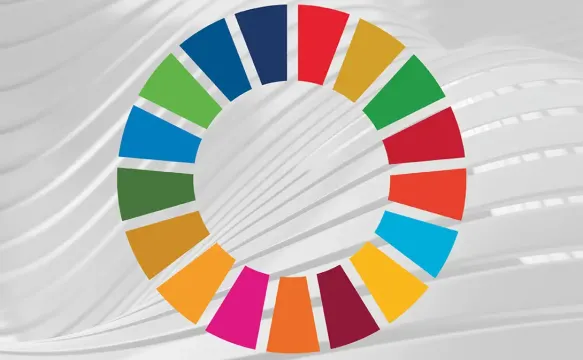Jeroen Douglas has served as general manager of the International Cooperative Alliance since the beginning of 2024. Despite his short time in the role, he is leading one of the most important events for cooperativism in this century: the United Nations (UN)–declared International Year of Cooperatives for 2025. Douglas is clear about his priorities for this year: to grow the cooperative movement and position it as the necessary catalyst for a sustainable future.
What are the objectives for the 2025 International Year of Cooperatives?
In November 2023, it was announced that the United Nations would declare 2025 as the second International Year of Cooperatives, following the first one in 2012. This is a big deal because it brings cooperatives into the global spotlight. The goal for 2025 is to show the world that the cooperative movement is possibly the best partner for the UN to help achieve the Sustainable Development Goals (SDGs). Cooperatives work across many sectors and address all 17 SDGs.
In 2023, during the UN’s midterm review, the Secretary-General reported that only 17% of the SDG targets had been met so far. So, the UN is looking to the cooperative movement to help drive a final push towards these goals. For me, the International Year is a chance for us to accelerate our work, especially as we approach the 2030 deadline for the SDGs.
The first International Year of Cooperatives was in 2012. What were the achievements back then, and what are the expectations for 2025?
2012 was a big success. The main event was held in Rochdale, where the cooperative movement began in the mid-19th century. Over 10,000 people joined in the celebrations.
However, in 2012, most of the celebration was internal, directed at the cooperative community itself. This time, I want us to be more outward facing, to reach the broader world and demonstrate the value of cooperatives to society as a whole.
What role does cooperativism play in the world today?
Cooperativism is more relevant now than ever. Cooperatives have shown resilience through major events like the World Wars and shifts in economic systems. However, during the rise of neoliberal globalization, cooperatives were somewhat sidelined as capitalist models took center stage.
Now, we’re seeing that the promises of this model haven’t fully materialized. A significant percentage of the global population still lives with an income below $20,000 a year. Cooperatives provide a human-centered economic model that could offer a different path. As globalization shifts, the cooperative model, which focuses on bottom-up growth rather than top-down control, is gaining renewed attention.
Cooperatives are built on principles like resilience, solidarity, self-help, inclusivity, and equity
In a world that’s increasingly polarized, do cooperativism’s values still hold a place?
Yes, absolutely. Cooperatives are built on principles like resilience, solidarity, self-help, inclusivity, and equity. Anyone, regardless of gender, age, race, or religion, can join a cooperative. The principles of democracy within cooperatives also foster a sense of belonging and community.
The world today faces challenges like inequality, climate change, and even conflict. Cooperatives can act as peacebuilders and demonstrate an alternative model for collaboration. In these turbulent times, the cooperative values of community and collaboration are not only relevant but essential.
How do cooperatives manage to be both local and global? How can this balance be maintained?
Great point. Cooperatives are indeed connected globally, drawing from a shared well of human-centered values. At the same time, they focus on creating sustainable communities at the local level.
This balance faces a few key threats: growing inequality, disruptive climate change, and market concentration controlled by a few large multinationals. Additionally, cooperatives must stay true to their values and resist influences that could undermine their principles. By fostering strong education, purposeful leadership, and inspired membership, we can protect this local-global balance.
Can cooperatives offer solutions to significant issues like discrimination and climate change?
They can, they do, and they must. While cooperatives can't solve everything, they can contribute meaningfully, especially at a local level. For instance, cooperatives can promote renewable energy initiatives and adopt net-zero practices, potentially becoming carbon-neutral by 2050, similar to the European Green Deal.
On social issues, cooperatives prioritize diversity, equity, inclusion, and belonging. We embrace people from all backgrounds, and although there’s room to improve, especially in terms of leadership diversity, cooperatives aim to be places where everyone feels respected and valued.
I see Spain as an example of how to integrate the social economy with cooperatives at its core
Your upcoming convention will be held in India. Why was Delhi chosen as the location?
The choice was made before I joined, but it makes perfect sense. India has the most cooperatives in the world—over 800,000 with 220 million members. For India, it’s a point of pride to host the global cooperative community for the first time. And there’s more: the official global launch of the 2025 International Year of Cooperatives will take place in Delhi, potentially with Prime Minister Modi in attendance.
Spain also has a strong cooperative network. What role do you see for Spain in this upcoming year?
Spain is a leader in the social economy, which complements cooperatives. Spain’s Ministry of Social Affairs is strongly supportive, and the Spanish cooperative sector is thriving. I see Spain as an example of how to integrate the social economy with cooperatives at its core, showing the world how to build a successful social economy model.
How can other countries get involved in the International Year of Cooperatives?
Countries can participate in many ways, depending on their unique cooperative landscapes. Events are already planned in places like England, Sweden, the United States, Brazil, Argentina, Kenya, South Africa, Japan, and China. The unifying theme will be the cooperatives' commitment to achieving the SDGs and showing how they can be instrumental in sustainable development.


